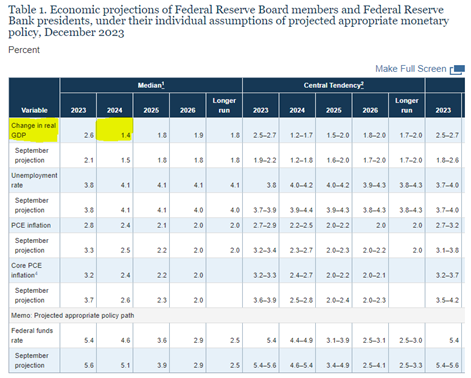Best of 207 Awards! RSWA was awarded the highest honor and Gold Medal for Wealth Management plus the Silver Medal for Financial Planning in the Best of 207 awards! The awards are to recognize the top businesses and services in the state of Maine as voted on by the public. This is the second year in a row we have won, and we are no less humbled and thankful for being recognized. We have said it many times in the past, we are incredibly grateful to be able to do the work we do and for the trust our clients and other professionals have placed in us. We always strive to do the highest level of work we can and to always improve, and we truly appreciate the recognition of our efforts. Thank you to everyone who voted for us! The Best of 207
And on to the weekly newsletter:
How are Economists like weather forecasters? I hate to beat up on economists, but lately, it has been easy to do. In all fairness, they have a very difficult job in predicting the economy just as meteorologists do in predicting the weather. The economy is very complex and dynamic in so many ways, it's easy to see how they get it wrong. And the pandemic has made predicting future economic events all that more complicated. But let’s highlight a few bad calls in recent years:
Transitory Inflation – Wrong. The Federal Reserve, and many others, thought inflation in 2022 would come and go and the need to raise short-term rates quickly was unnecessary. Instead, inflation proved to go much higher, and be much stickier than most thought and the fight continues more than two years later, though inflation has abated quite a bit.
We’re Heading Into a Recession – Wrong. Many well-known economists thought 2023 would consist of stagflation – high inflation with no economic growth. Instead, we had strong company earnings and strong hiring, and inflation came down from nose-bleed levels quicker than most thought.
CNBC – Economic Forecasts Have Been Wrong Lately
Slow or Sluggish Growth for 2024 – Wrong? For 2024, most economists have predicted slow growth for the U.S. economy. The Federal Reserve predicts the U.S. economy will grow by 1.4 percent this year as seen in the first chart below. The longer-term growth potential of the U.S. economy is thought to be about 1.8% which is what is predicted for the years following 2024. But as you can see in the second chart, Atlanta’s Fed GDP NOW chart, which tries to gauge the economy in real-time, is reading Q1 GDP growth at about 3.2%, more than double the Fed’s prediction for the year. The GDP NOW indicator is volatile and imperfect, but shouldn’t be ignored because economists had similar low predictions for Q3 and Q4 growth that were well off but GDP NOW read more accurately. There is still a lot of time left this year, but as the year rolls on, we’ll see if economists are wrong yet again.

Source: Federal Reserve
.png?width=477&height=400&name=fai%2003.01.41%20(1).png)
Source: Atlanta Federal Reserve
Inflation Update: The Fed’s preferred inflation indicator came out for January this week, the Personal Consumption Expenditures Price Index, or PCE Index. The index rose 0.3% for the month and 2.4% over the last year, hitting the lowest level in three years. Excluding volatile food and energy it increased 0.4% for the month and 2.8% from a year ago. The increases came in line with expectations as inflation continued its march downward after the last couple of years. Yahoo Finance
Financial Planning/Investment Strategy Corner:
Gifting $1 Billion: Wow! Ruth Gottesman donated $1B (yes, billion) to the Albert Einstein College of Medicine so no student will ever have to pay tuition again. It’s a fascinating story about philanthropy, idealistic students becoming doctors in a poor community, Berkshire Hathaway stock, and how the Federal government never received one dollar in tax. I’m using this article to highlight the gifting of highly appreciated securities that matter to investors. We’ve written many times about how philanthropic clients can donate appreciated securities to non-profit organizations whether directly or indirectly but it’s a good reminder as we are all filing our tax returns and actions we can take now for the 2024 tax year. Reach out to your advisor or CPA if you have any questions on how to utilize tax-saving strategies to fulfill your charitable giving. Axios Albert Einstein College of Medicine RSWA Blog – Donor-Advised Funds
Annual Reminder – Get Your Tax Forms to Accountants: Speaking of tax season, this is our friendly reminder to get all your information to your accountant for tax filing. The number one complaint we receive from accountants is that they are waiting on forms from clients. Make their lives easier by getting your forms to them ASAP. And give them a smile or tell them a joke – they need it this time of year!
Quick Hits:
- Six exercises you can do for anyone stuck at a desk: WSJ
- This past week was the 44th anniversary of one of the biggest upsets in sports history, when the U.S. Men’s hockey team defeated the Soviets, 4-3. Watch the last minute: YouTube
- The hunt for the world’s oldest DNA may help us develop crops for a warmer future: PBS – Nova
- Chernoblyl’s mutant wolves may have developed anti-cancer abilities: IFL Science
- Our attention spans have been shrinking, and it’s called the “popcorn brain” effect: Axios
What Happens If You Let an Algorithm Run Your Life? Bryan Johnson spent a decade in the “grind culture” of heavy work founding a startup business. He was prone to binge eating, depressed, and in poor health. With the financial freedom to do anything after selling his business, he decided to focus on optimal health for wellness and longevity. Not trusting himself, he turned over decision-making in life to an algorithm-driven by evidence-based health. He now makes zero decisions and is the most medically tested human in history. But the 46-year-old’s biomarkers now place his health equal to the top 1.5% of healthy 18-year-olds, inflammation lower than the average 10-year-old, and reduced his speed of aging by the equivalent of 31 years. He places high emphasis on sleep, eats a lot of fruits and vegetables and finishes eating by 11:30 AM, doesn’t drink alcohol, stays out of strong sunshine, and exercises every day. The algorithm requires constant testing, one of the oddest being injecting the blood plasma of healthy individuals into others. Oh, and he had his healthy plasma given to his 71-year-old father which lowered his father’s speed of aging by 25 years! Maybe not all of us want to run our lives by a formula, but probably a few takeaways for sure. The Knowledge Project - Episode #188
Quote: “The elimination diet: Remove anger, regret, resentment, guilt, blame, and worry. Then watch your health, and life, improve.” Charles F. Glassman
Thank you for reading RSWA Financial Advisor Insights! We welcome feedback, and please forward this to a friend! Be well, take care, and stay safe!
